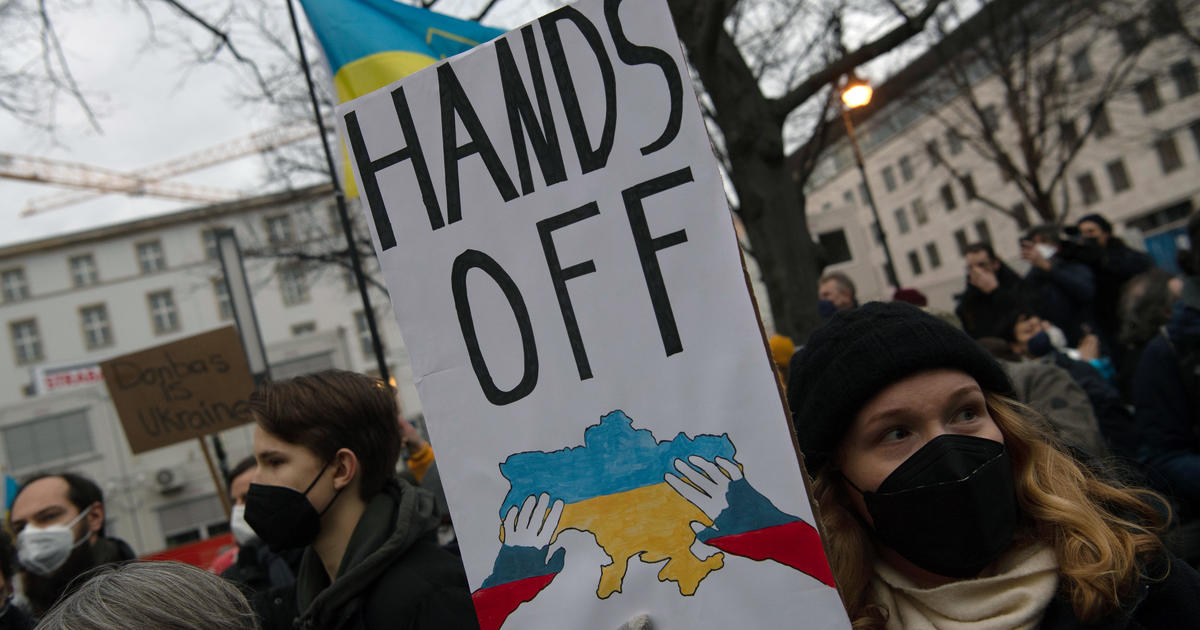
Although many Americans may prefer that the U.S. stay out of the conflict between Russia and Ukraine, the brewing violence and political fallout are already hurting their wallets. Gasoline prices, which have hit eight-year highs — could surge even further if the hostilities escalate or if U.S. lawmakers pass another round of sanctions.
The economic impact could also move beyond the gas pump, Wall Street analysts warn. Sanctions or export controls against Russia could make current semiconductor shortages even worse, while restrictions on wheat or metals could drive the fiercest bout of inflation in decades to climb even higher.
"Shock waves across America"
Russia is a major exporter of crude oil, accounting for about 12% of the world's supply. Any disruption to those exports is likely to drive prices at the pump higher for consumers, experts said.
"If Russia makes a run on Ukraine, we could see [oil prices] over $100 a barrel next week," said Patrick DeHaan, head of petroleum analysis at GasBuddy, adding that average gas prices across the U.S. are likely to hit $4 a gallon in the weeks or months to come.
"That $4 is something we haven't seen in so long — it would cause shock waves across America," he said.
A key factor in how hard the conflict hits the economy will be how Russia responds to the U.S. sanctions that President Biden outlined Tuesday afternoon. Mr. Biden moved to cut off two Russian banks, and the state's sovereign debt, from western financing, while individuals will also be targeted.
Russia could retaliate by halting oil and natural gas exports, DeHaan said. That would put pressure on gasoline and natural-gas prices in the U.S., which have already spiked this year.
"The world economy does depend on global energy. How does the world sanction Russia's economy without Russia saying, 'We're going to take the next step for you and not export any more energy'?" he asked. "If Russia's economy is going down the tubes, they're going to take the global economy with it."
The White House is considering another release from the Strategic Petroleum Reserve, the Washington Post reported Tuesday, and U.S. officials are planning to divert more natural gas to Europe.
Another hit to supply chains
Although oil is Russia's most important export, both Russia and Ukraine are also large agricultural suppliers, sending wheat, rye, barley and other grains to Central Asia and the Middle East. Disruptions in commodities could send global food prices higher, putting pressure on U.S. consumers.
Russia also produces just under half of the world's palladium and smaller portions of platinum and nickel — key elements in complex microchips that are used in "everything from electrical meters to sophisticated BMWs," said RSM Chief Economist Joe Brusuelas. Russia is also a major producer of aluminum.
Ukraine is Europe's top producer of uranium and has vast deposits of titanium, manganese, iron and mercury, Peter Boockvar, chief investment officer at Bleakley Advisory Group, said in a report.
"Because commodity prices are as high as they are, any disruptions will really matter," he said.
While the extent of the hit would be uncertain, bottlenecks in critical metals could worsen the current semiconductor shortage and further push up prices of cars, electronics and other big ticket items. Along with rising commodity and energy costs, that threatens to make today's price increases even worse for many consumers.
"What we're talking about is another round of supply shocks in the developed economies," Brusuelas said.
More inflation, slower growth
Rising prices for commodities would leave U.S. consumers paying more for fuel and other necessities, leaving less money for discretionary spending.
"As costly as another European war would be in human and economic terms, its economic burden in the United States would fall hardest on the middle and working classes," Brusuelas said.
While prices spiked during the coronavirus pandemic, consumers were able to weather the shock thanks to enhanced unemployment benefits, federal stimulus payments and tax credits from the U.S. government.
In the case of a full-fledged war in Ukraine or harsher sanctions on Russia, the shock to energy prices and reduced consumption could bring down U.S. economic growth by 1%, Brusuelas said.
"Should energy prices increase more than our baseline expectation of 20% to, say, near 40%, we will be talking about a premature end of the business cycle," he noted.
World - Latest - Google News
February 23, 2022 at 08:26PM
https://ift.tt/7PMbZfE
How the Ukraine crisis is already hitting Americans' wallets - CBS News
World - Latest - Google News
https://ift.tt/nvzP57G
Bagikan Berita Ini














0 Response to "How the Ukraine crisis is already hitting Americans' wallets - CBS News"
Post a Comment